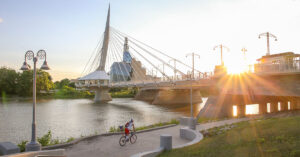Support for the Conservative Party declined on the long weekend after a week that saw Leader Stephen Harper on the defensive over the economy and the government’s response to the international migrant crisis, a new poll shows.
Long weekends are considered to be key moments during election campaigns because friends and family come together to discuss politics, which can influence voting intentions.
The Nanos survey suggests many Canadians switched their voting intentions in recent days. The three-day sample puts support for the NDP at 32.7 per cent nationally (up 2.3 percentage points from a week ago), followed by the Liberals at 30.8 per cent (up 0.6 percentage points). Support for the Conservatives has slipped to 26.2 per cent (a 2.3-percentage-point drop).
With six weeks remaining until the Oct. 19 vote, Labour Day marked the start of heightened campaigning by political parties.
The shift away from the Conservatives is such that pollster Nik Nanos says the campaign is looking as if it could be a two-way race for power between the NDP and the Liberals.
Mr. Nanos believes the issue of Syrian refugees was the trigger for the party’s recent decrease in popularity.
“The one thing [that is] different about the Syrian refugee crisis is there’s an emotional, personal angle to this,” he said.
The NDP is leading in Quebec and British Columbia, while the Liberals are ahead in Atlantic Canada and Ontario. The Conservatives are the first choice among Prairie voters.
Mr. Nanos said the Conservative numbers are likely due to the combined impact of three weeks spent responding to the Mike Duffy trial, followed by last week’s news that Canada experienced a technical recession in the first half of 2015 and then the unfolding refugee crisis.
In terms of opportunity for growth, there is more troubling news for the Conservatives in the Nanos poll. The proportion of Canadians who would consider voting Conservative has decreased to 36.1 per cent. In contrast, 52.5 per cent of those surveyed would consider voting for the NDP and 49.2 per cent would consider voting for the Liberals.


